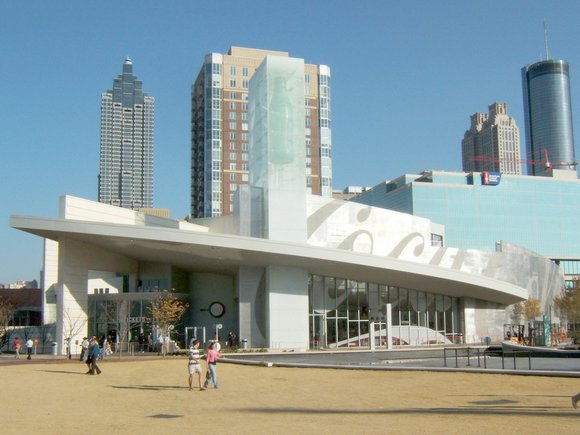Coca-Cola UK Headquarters Blocked by 2.5-ton Sculpture Protest
CNN/Stylemagazine.com Newswire | 4/11/2017, 9:03 a.m.
By Judith Vonberg
CNN
(CNN) -- Greenpeace activists blocked the entrance to Coca-Cola's UK headquarters in London with a 2.5-ton sculpture featuring a seagull regurgitating plastic, and called for the company to do more to help prevent plastic pollution.
The campaign group said the sculpture, which depicts an idyllic family beach scene interrupted by birds choking on plastic, was intended to highlight what it claimed were failings by the company.
In a report released on Monday, Greenpeace claimed that Coca-Cola -- the world's largest soft drinks company -- sells more than 100 billion plastic bottles every year. Single-use plastic bottles make up nearly 60% of the packaging produced by the company globally, the report says.
It is impossible to know how many of these bottles end up in seas and oceans, but Greenpeace said Coca-Cola wasn't doing enough.
"We were trying to uncover for the first time the true size of Coca-Cola's plastic footprint," Louisa Casson, oceans campaigner for Greenpeace, told CNN. "And we are actually seeing them going backwards. Rather than investing more in refillables and reusables, they've increased their use of single-use plastic bottles over the last decade."
Coca-Cola said it was "disappointed" by the action by Greenpeace, and said it would publish a new "sustainable packaging strategy" later this year.
'Missed targets'
Casson said that although "the company continues to call on their customers to recycle," only 7% of Coca-Cola bottles on average are made with recycled plastic.
Casson pointed out that several soft drinks brands already use 100% recycled material in their bottles, including Suntory's UK brand Ribena and PepsiCo's 7Up, which has been sold in 100% recycled "Eco-Green" bottles since 2011.
Greenpeace claimed Coca-Cola is also falling behind on its target to recycle the equivalent of 75% of the bottles and cans it sells in developed countries by 2020, despite their bottles being 100% recyclable.
"We've installed this (sculpture) at their front door today to stop them washing their hands of the problem," said Casson.
"Plasticide" was designed by underwater sculptor Jason deCaires Taylor. At 2.5 tons, the sculpture is "pretty heavy," Casson said, "but ten times that weight of plastic is flowing into the oceans every single minute."
The problem of marine litter
In a written statement to CNN, a Coca-Cola spokesperson said: "We are disappointed by today's stunt and the report from Greenpeace UK, especially as we have been consulting with them to develop our new sustainable packaging strategy which we will publish in the summer."
"Coca-Cola is one of the few consumer goods companies whose packaging is 100% recyclable," the spokesperson said.
"In Great Britain, we have reduced the amount of packaging we by use by 15% since 2007 and we currently use 25% recycled plastic in all of our bottles. Globally, we continue to increase the use of recycled plastic (rPET) in countries where it is feasible and permitted.
"We recognize marine litter is a global problem affecting the world's oceans," the spokesperson said. "We agree that action is needed, are open to doing more and to working with others to create long-term, effective solutions."
One soft drinks bottle can take hundreds of years to fully degrade. Coca-Cola has not disclosed how many plastic bottles it produces each year, but a previous Greenpeace study found that 530 billion plastic PET bottles were produced around the world in 2014, just over half of which were recycled.
That study found that six of the top soft drinks companies in the world, including PepsiCo, Danone and Nestle, use a combined average of 6.6% recycled material in their bottles.
Casson told CNN she would like Coca-Cola to take the lead on producing more environmentally-friendly bottles, and hopes Greenpeace can work with the firm to reach that goal.
"We would like to see them lead the sector by ditching throwaway plastic, embracing reusable models and rapidly moving towards 100% recycled content for the remainder of their packaging," Casson said.
"It's a huge global crisis facing our oceans," she added. "But if we're going to tackle it at source we're going to need concerted action from the companies."








